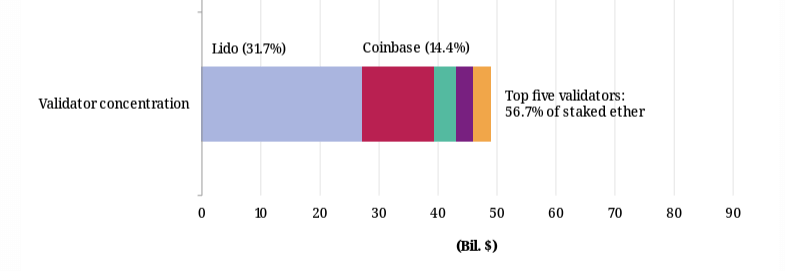The potential approval of spot Ethereum (ETH) exchange-traded funds (ETFs) within the US, which incorporates plans for staking, would possibly amplify focus dangers inside the Ethereum community, S&P World Scores highlighted in a latest evaluation.
Based on the report, the SEC might approve ETH ETFs as early as Might. Nevertheless, as monetary heavyweights vie for a stake on this rising sector, the entry of ETFs might considerably sway the steadiness of validator energy in Ethereum, posing new challenges and alternatives.
The SEC has to resolve on VanEck’s utility by Might 23 and will rule on different ETH ETF purposes by that deadline.
Focus dangers
Spot Ethereum ETF proposals from Ark Make investments and Franklin Templeton goal to generate further yield by staking ETH. Nevertheless, if these staking-enabled ETFs see sufficiently excessive inflows, they may affect participation charges in Ethereum’s validation community, S&P World analysts wrote.
Based on the report, Lido at present accounts for slightly beneath one-third of staked ETH and is the biggest Ethereum validator. Nevertheless, the report casts doubt on the probability of those ETFs choosing decentralized staking protocols similar to Lido.
As a substitute, a desire for institutional crypto custodians appears extra possible, suggesting a distinct affect on validator focus relying on the diversification methods of issuers.

The report additionally highlighted that Coinbase — which serves as a custodian for some funds — might additionally pose a focus danger if it takes in new ETH on behalf of US ETFs.
The alternate is at present liable for roughly 15% of staked ETH, making it the second-largest validator general. It additionally serves because the custodian for 3 of the 4 largest non-US staking Ethereum ETFs.
The report stated these points are essential as a result of reliance on a single entity or software program consumer can introduce dangers of validator outages and assaults. It known as for larger monitoring of focus danger and emphasised its significance.
The emergence of latest digital asset custodians might supply a pathway for ETF issuers to distribute their stakes extra broadly, which might additionally mitigate focus danger.
JP Morgan echoes considerations
S&P World’s report echoes the considerations not too long ago raised by JP Morgan in the same evaluation about spot Ethereum ETFs. The lender’s report additionally concluded that the dominance of Lido and Coinbase poses important focus dangers to the ecosystem.
JP Morgan argued {that a} concentrated variety of validators might develop into a single level of failure, jeopardizing the community’s stability and safety. Such centralization additionally presents profitable targets for malicious assaults, starting from hacking makes an attempt to coordinated disruptions of community operations.
Moreover, the analysts at JPMorgan cautioned in opposition to the potential for collusion amongst main validators. An oligopoly of validators might manipulate the community’s governance and operational parameters to their benefit on the expense of Ethereum’s broader person base.
This might manifest in censoring transactions, partaking in preferential remedy of sure operations, or front-running — practices that may erode belief in Ethereum’s equity and transparency.
Making certain that Ethereum stays a strong, safe, and decentralized platform requires a collective effort to mitigate focus dangers and to foster an setting the place no single validator or group of validators can wield disproportionate energy.

